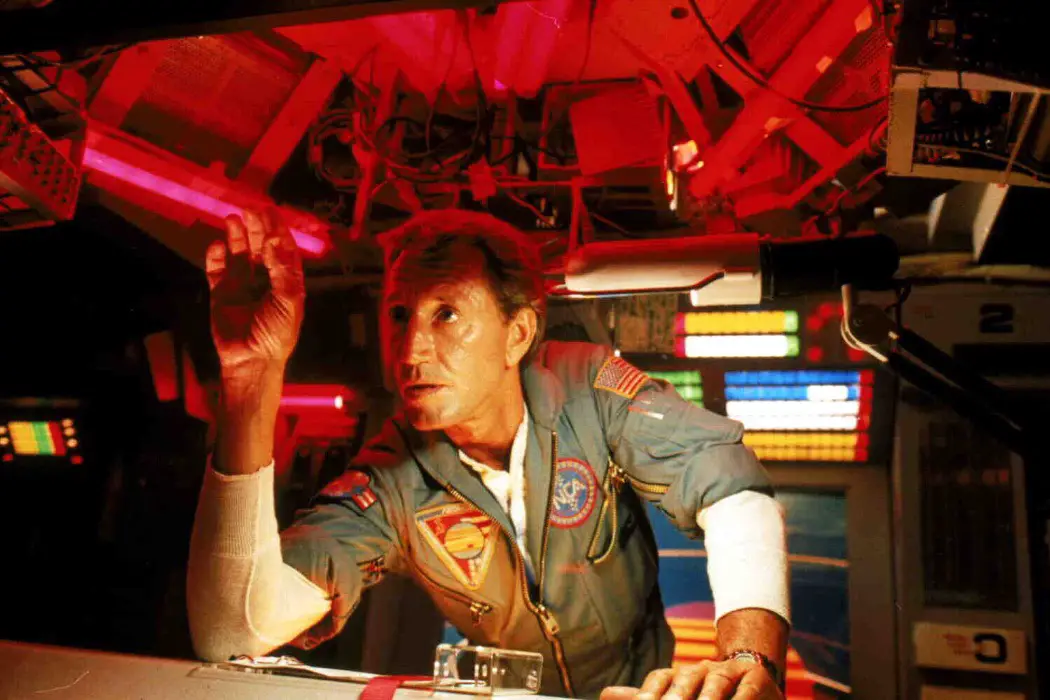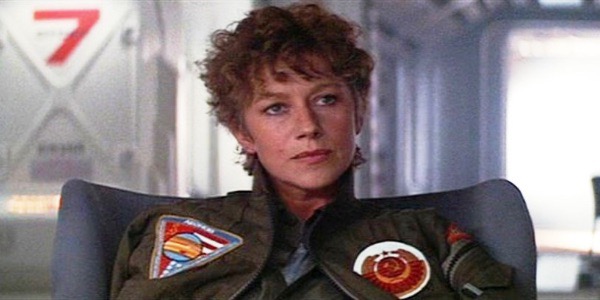The Enigma of the Sequel: Why Was 2010 Made?

Frank H. Wu is William L. Prosser Distinguished Professor at…
As everybody who cares about film celebrates the re-release of 2001: A Space Odyssey, nobody has bothered to mention 2010: The Year We Make Contact. That should be no great surprise, because the Stanley Kubrick masterpiece generated a so-so sequel that ruins the mystery essential to the earlier movie’s success. For the sake of completion, however, there may be audience members curious to check out the 1984 movie directed by Peter Hyams from his own screenplay (based on a novel by Arthur C. Clarke), starring Roy Scheider, Helen Mirren, and John Lithgow, with the return of Keir Dullea and Douglas Rain (the voice of HAL 9000, with its calm Canadian accent).
2001 has been acknowledged as among the surpassing instantiations of film art from the moment it premiered. A half century from its appearance in the revolutionary year of 1968, a fan with the ability to make it happen, director Christopher Nolan, has brought it back to the big screen, in an “unrestored” version running the road show circuit. For his control over craft and cast, Kubrick reportedly made 2001 in a chaotic manner without a clear plan at the outset, putting it on the vastness of widescreen to uncomprehending jeers.
Was Anyone Wondering What Happened to Heywood Floyd?
In 2010, Heywood Floyd (now played by Roy Scheider) has been exiled to university administration, with a side job repairing satellite dishes, when he is approached by a Russian counterpart who proposes they jointly send up astronauts to determine what happened aboard the Discovery with Dr. David Bowman (Keir Dullea) and Dr. Frank Poole (Gary Lockwood).
The Americans have the protocols to operate the HAL 9000 computer but have no vehicle ready to launch, while the Russians have the vessel but not the codes. The captain for the mixed crew will be the Russian Tanya Kirbuk (Helen Mirren). They have not learned the lesson that any mission to figure out what went wrong with an earlier mission is itself doomed.

Director Hyams, credited as a producer as well, was no slouch in science fiction. Before 2010, he wrote and directed Capricorn One (1977), about a Mars landing hoax; and Outland (1981), a Sean Connery Western set on a mining outpost of a Jupiter moon. After, he was responsible for Timecop (1994), a fine flick starring Jean Claude Van Damme in the title role pursuing an unethical politician manipulating history. These are all at least good and arguably very good, but none of them was a sequel. Nobody would attempt a sequel to Kubrick’s Lolita (1962), Dr. Strangelove (1964), or A Clockwork Orange (1971) – none of his works are amenable to such treatment.
2010 suffers from two profound problems: it spoils the subtlety of the precursor and it also has not stood the test of time. The former is the cause of the latter. Since 2001 was open to interpretation, it can be viewed again and again and again. A puzzle that is solved is no longer interesting. The failure of the producers to appreciate the challenge is itself baffling, since what they have wrought is not incompetent but is nonetheless a failure.
In considering the disappointment of 2010, it would be tempting to blame the profit motive of the studio. That would be misguided. Almost all movies are created by people who wish to sell tickets, and many of those motion pictures achieve as much commercially as they do critically. Samuel Johnson once remarked that nobody but a blockhead ever wrote except for money.
What Did We Know in 2010 That We Didn’t in 2001?
2010 is not the only sequel to debase its source. The Two Jakes (1990), for example, is a mess that picks up where Chinatown (1974) left off with gumshoe Jake Gittes (Jack Nicholson), of the slashed nose and anti-Semitic faux father. The catastrophe of 2010 also is not unique. Its makers sought to answer questions, as we all do in life. The trouble is that there are many answers to the best questions, or, alternatively, there is no single response that can bring to closure definitively those discussions about morality and mortality that are ongoing yet urgent. The questions of 2001 that were implicit in 2010 were rendered explicit, in a needless closing voiceover that is an attempt, final and futile, to relate the two movies.

2001 was about birth and rebirth through discovery and death. It was about the banality of human interactions, our relationship to machines and the universe, what can be known and what must be unknowable, the limits of technology, and the possibilities of faith. Or perhaps it was about none of that. Maybe it was merely a series of futuristic images set to classical music. It became a cultural phenomenon, of its time and beyond, billed as “the ultimate trip,” with no sarcasm about how it could be enhanced by psychedelics.
2010 seems dated in its politics and its technology. It opens with lengthy exposition, an immediate signal of weakness in the narrative – imagine if its predecessor had a voiceover about the proto-human primates – which establishes that the Cold War is heating up between the USSR and the USA, with an emphasis on Central America. That deliberately grounds the plot circa mid-1980s, without any possibility of suspension of disbelief even when it was released.
The sci-fi genre often, some might say always, is allegorical or metaphorical, so it isn’t a sin to incorporate then current geopolitics; it was a risk that was taken which didn’t turn out given subsequent events, e.g., the fall of the Berlin Wall, in our iteration of the multiverse. 2010 also is dated in casting through “whitewashing.” Dr. R. Chandra is Bob Balaban.
2001 had superior special effects, but there is an explanation. Some of it is due to cinematography. Kubrick was a visual stylist who knew his cameras from his teen years as a staff photographer for the pictorial magazines that are long since defunct – Carl Zeiss f/0.7 glass, anyone? The elegance of 2001 is in its conceptualization of the day after tomorrow and how it is depicted, such as the centrifugal track along which Bowman jogs as if it is perfectly ordinary.

Its F/X had to be created with giant sets and equally physical miniatures, and in camera on film, not with digital techniques yet to be invented. 2010 resembles like a fan trailer of today because it was put together in an awkward period, as the heyday of the models was giving way to the advent of real devices that had earlier only been imagined concepts – the fictional supercomputer, with Hal 9000’s inner structure of 1968 is more impressive than the mechanical-switch keyboards, of 1984. The Microgramma font on signage in 2001 still looks modern; the 8-bit font on the screen in 2010 is so crude as to induce cringing.
Wasn’t Mr. Spock Reborn That Year Too?
If any aspiring screenwriter has to be persuaded to “show, don’t tell,” Chandra’s monologue about why HAL 9000 had to lie (on orders from the White House, given by politicians comfortable with falsehood) would be a decent example of why the advice remains worth repeating. A character who tells another character what an author wants to communicate to the viewers reveals that behind the curtains there is a little man pretending to be the powerful Wizard of Oz. Even in dramas that are not realistic, the effect is to destroy the flow.
[Spoiler alert.] The same year that 2010 came out, Star Trek III: The Search for Spock was also released. Like 2010, Spock concerns a deceased space explorer. And like 2010, in which Bowman is resurrected albeit in different form, Spock comes back to life. There is even the parallel of a new, Edenic planet within which life itself will flourish. The reason Spock is effective is that it was preceded and followed in a series that constituted a series. So it is anything but an afterthought.
There are completists among us who are compelled to finish what they have started no matter what. If 2010 stood alone, it would be passable; but it has to compete with a monolith that casts quite a shadow. For those who are not as obsessive, their experience of 2001 will be the better for not bothering with 2010. 2001 was visionary and original. 2010 is neither.
Is it unfair to the team that made 2010 to compare it to 2001? Tell us your thoughts in the comments below!
Does content like this matter to you?
Become a Member and support film journalism. Unlock access to all of Film Inquiry`s great articles. Join a community of like-minded readers who are passionate about cinema - get access to our private members Network, give back to independent filmmakers, and more.
Frank H. Wu is William L. Prosser Distinguished Professor at University of California Hastings College of the Law, where he has taught on film and law; he previously served as Chancellor & Dean at the institution. He has been published everywhere from the New York Times and Washington Post to the Chronicle of Higher Education and National Law Journal to Huffington Post, and he writes regularly about photography for 35mmc. He is a fan especially of 1970s paranoid thrillers.












